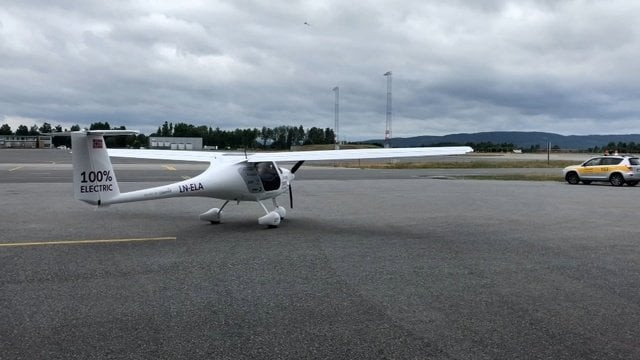Norway tests electric plane, sees passenger flights by 2025
The country tops the world league for per capita sales of electric cars

Norway has tested a two-seater electric plane, predicting a start to passenger flights by 2025 if new aviation technologies match a green shift that has made Norwegians the world's top buyers of electric cars, as Reuters' Alister Doyle discovered. Jim Drury reports.
PHOTO: REUTERS
Transport Minister Ketil Solvik-Olsen and Dag Falk-Petersen, head of state-run Avinor which runs most of Norway’s airports, took a few minutes’ flight around Oslo airport in an Alpha Electro G2 plane, built by Pipistrel in Slovenia.
“This is ... a first example that we are moving fast forward” toward greener aviation, Solvik-Olsen told Reuters. “We do have to make sure it is safe - people won’t fly if they don’t trust it.”
Singapore plans smart city to run driverless electric cars
He said plane makers such as Boeing and Airbus were developing electric aircraft and that battery prices were tumbling, making it feasible to reach a government goal of making all domestic flights in Norway electric by 2040.
Asked when passenger flights in electric planes could start, Falk-Petersen, the pilot, said: “My best guess is before 2025 ... It should all be electrified by 2040.”
The two said the plane, with a takeoff weight of 570 kg (1255 lb), was cramped and buffeted by winds but far quieter than a conventional plane run on fossil fuels.
Norway tops the world league for per capita sales of electric cars such as Teslas, Nissan Leafs or Volkswagen Golfs, backed by incentives such as big tax breaks, free parking and exemptions from road tolls.
In May 2018, 56 per cent of all cars sold in Norway were either pure electric or hybrids against 46 per cent in the same month of 2017, according to official statistics.
Norway, a mountainous country of five million people where fjords and remote islands mean many short-hop routes of less than 200 km, would be ideal for electric planes, Solvik-Olsen said. Also, 98 per cent of electricity in Norway is generated from clean hydropower.
Some opposition politicians said the government needed to do far more to meet green commitments in the 200-nation Paris climate agreement.
“This is a start ... but we have to make jet fuel a lot more expensive,” said Arild Hermstad, a leader of the Green Party.
Incentives unlikely to whet appetite for electric cars
The first electric planes flew across the English Channel in July 2015, including an Airbus E-Fan. French aviator Louis Bleriot who was first to fly across the Channel, in 1909, in a fossil-fuel powered plane.
Electric planes so far have big problems of weight, with bulky batteries and limited ranges. Both Falk-Petersen and Solvik-Olsen said they had been on strict diets before the flight.



















COMMENTS
Comments are moderated and generally will be posted if they are on-topic and not abusive.
For more information, please see our Comments FAQ